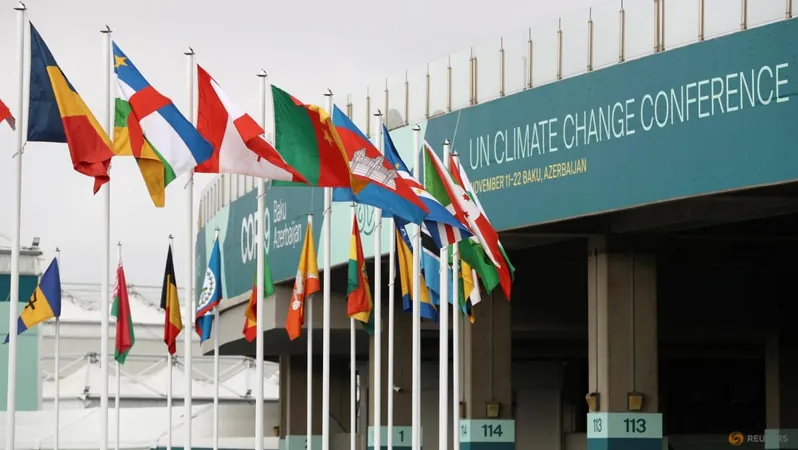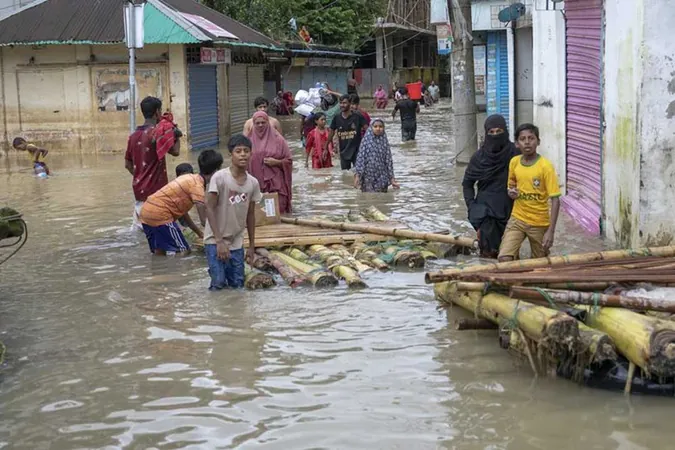
COP29 on the Brink: Rich and Poor Nations Clash Over Climate Funding—Time Running Out!
2024-11-21
Author: Wei Ling
BAKU:
The tension at the COP29 climate talks in Azerbaijan reached a boiling point as a new draft deal was unveiled, highlighting the deep divide between wealthy and developing nations with just one day left until the anticipated conclusion of the summit. This latest draft underscores the urgent need for a staggering $1 trillion per year to aid developing countries in combating climate change, but it remains vague on the specific financial commitments required to cement an agreement.
As delegates prepare to reconvene, this critical issue looms large over the negotiations. The 10-page document reflects the opposing perspectives of developed nations, which bear the responsibility for climate financing, and those developing nations that are in desperate need of support.
Li Shuo, director of the China climate hub at the Asia Society Policy Institute, pointed out the shortcomings of the current draft, noting, "The new finance text presents two extreme ends of the aisle without much in between." Key controversies—who will pay, how much, and the nature of the funding—remain firmly entrenched in the unresolved discussions.
Kenya's climate envoy, Ali Mohamed, emphasized the need for clarity, stating, "The 'elephant in the room' is the lack of a concrete number." He further urged developed nations to “urgently engage” on the matter, underscoring the critical nature of the discussions taking place.
Rich countries are now facing mounting pressure to disclose their financial commitments to help developing nations transition away from fossil fuels and enhance their resilience against climate disasters. Some developing nations are calling for a total commitment of $1.3 trillion, sternly opposing loans that could further exacerbate their debt burdens.
While the European Union and the United States—the largest contributors to climate finance—have refrained from providing specific figures, they assert that a clearer understanding of the deal's parameters is essential before making any commitments.
The implications of the lack of funding clarity are profound. Jasper Inventor from Greenpeace expressed frustration, stating, “The fact there is no number specified for the climate finance goal is an insult to the millions of people on the frontlines bearing the brunt of climate change impacts.”
Kenyan climate activist Mohamed Adow echoed these sentiments, stressing the absurdity of the current situation: "We came here to talk about money. The way you measure money is with numbers. We need a cheque, but all we have right now is a blank piece of paper."
An expert economic assessment commissioned by the United Nations reveals that developing countries, excluding China, will require $1 trillion annually in foreign assistance by 2030—a figure that increases to $1.3 trillion by 2035. However, the political and fiscal constraints facing many potential donor nations complicate the prospect of delivering these much-needed funds.
With the clock ticking, the stark reality remains: failure to bridge this financial gap could mean devastating consequences for the most vulnerable nations already grappling with the harsh realities of climate change. What will transpire as negotiations continue? Tune in as COP29 approaches its dramatic conclusion!



 Brasil (PT)
Brasil (PT)
 Canada (EN)
Canada (EN)
 Chile (ES)
Chile (ES)
 España (ES)
España (ES)
 France (FR)
France (FR)
 Hong Kong (EN)
Hong Kong (EN)
 Italia (IT)
Italia (IT)
 日本 (JA)
日本 (JA)
 Magyarország (HU)
Magyarország (HU)
 Norge (NO)
Norge (NO)
 Polska (PL)
Polska (PL)
 Schweiz (DE)
Schweiz (DE)
 Singapore (EN)
Singapore (EN)
 Sverige (SV)
Sverige (SV)
 Suomi (FI)
Suomi (FI)
 Türkiye (TR)
Türkiye (TR)